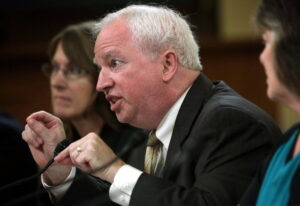
(Photo by Alex Wong/Getty Images)
Nine days ago, US District Judge David Carter ordered John Eastman to disclose several more emails to the January 6 Select Committee, finding that the crime-fraud exception abrogated attorney-client privilege. Specifically, he found that Trump and his lawyers knew that they were incorporating false claims about illegal voters in Georgia in an election lawsuit, and, furthermore, that the case was only filed “to disrupt or delay the January 6 congressional proceedings through the courts.”
He then ordered Eastman to disclose the disputed emails by 2:00 pm Pacific on October 28, 2022, i.e. in a few short hours.
Last night, Eastman filed a motion for reconsideration and/or stay pending appeal, although no such appeal has yet been noticed to the Ninth Circuit.
“Dr. Eastman respectfully submits that the relevant context shows that this ruling was clearly erroneous,” his lawyers wrote. In their telling, the court is simply confused and taking things out of context. That’s right … he’s going with the Shaggy defense.
“Dr. Eastman submits that the full email record clearly shows that the President’s lawyers took great care to ensure all court filings were accurate,” his lawyers insist, adding that “Dr. Eastman submits that the full email record demonstrates that the legal filings were all designed to obtain a ruling from the court on the contested election challenges.”
In support of this proposition, the plaintiff filed an affidavit under seal drawing the court’s attention to several other emails which will somehow make it clear that everything was on the up and up. Sure, Eastman did write “Although the President signed a verification for [the state court filing] back on Dec. 1, he has since been made aware that some of the allegations (and evidence proffered by the experts) has been inaccurate. For him to sign a new verification with that knowledge (and incorporation by reference) would not be accurate.” And, okay, Trump did go on to sign the verification incorporating the false claims and which he purportedly “believed to be true and correct.”

How The Law Office Of Stephen L. Thomas Jr. Reclaimed Valuable Hours And Strengthened Client Care With 8am
Founded in 2017, the Baltimore-based Law Office of Stephen L. Thomas Jr. unified case management, communication, and payments with 8am—saving 10–20 hours a week for clients, trials, and growth.
But if Judge Carter will simply examine the emails he already looked at during this privilege review some more, he’ll understand that Trump believes a lot of crazy shit when it’s in his best interests, and so he wasn’t lying in a court document with the connivance of his counsel.
Unfortunately for Eastman, the court made it clear that it looked at the entire context to arrive at the conclusion that the purpose of filing the Georgia lawsuit was “in furtherance of the obstruction
In one email, for example, President Trump’s attorneys state that “[m]erely having this case pending in the Supreme Court, not ruled on, might be enough to delay consideration of Georgia.” This email, read in context with other documents in this review, make clear that President Trump filed certain lawsuits not to obtain legal relief, but to disrupt or delay the January 6 congressional proceedings through the courts. [Emphasis added.]
Which doesn’t seem like the writings of a court which is inclined to swoop in and grant relief pending an appeal which hasn’t even been filed, but hope springs eternal.
Eastman v. Thompson [Docket via Court Listener]
Liz Dye lives in Baltimore where she writes about law and politics.
